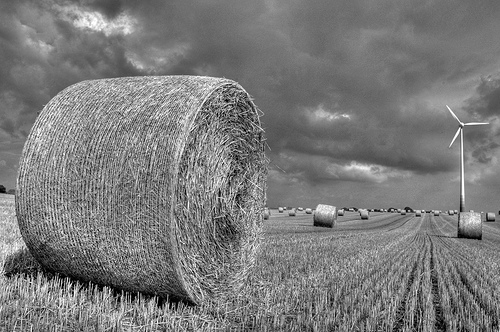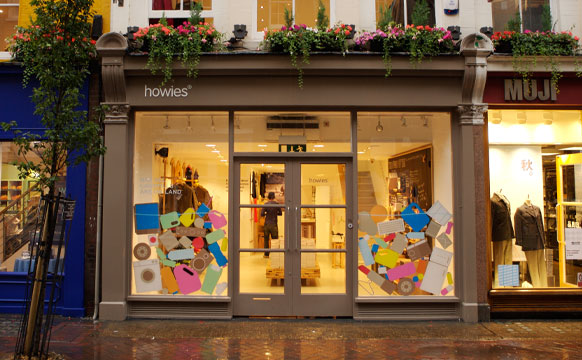Ecosystems update

Image courtesy of Hans van Reenen
A while ago I introduced the idea of brand ecosystems. These are a group of mutually reinforcing brands, usually from different sectors that co-exist and often co-operate with a high likelihood that a customer of one part of the ecosystem will become a customer of the rest of its members.
Well I have been thinking about this a little more recently.
The prompt was a newletter from Good Energy along with my electricity bill. But interestingly the subject also came up in a client meeting this week.
I have banged on about Good Energy before as one of the collection of Dynamic Micro brands I am interested in. They are the only electricity supplier in the UK delivering 100% renewable electricity to customers and I love them - not bad given they are a power utility. Indeed you could absolutely suggest that they are a Lovemark of mine because my loyalty to them is beyond any kind of reason (they charge rather more than other electricity suppliers).
Good Energy has a very clear set of values and opinion on the world and this means that locating other brands in its ecosystem is relatively easy - they are the ones that share some or all of its values. In the case of the newsletter the two ecosystem co-habitees are Able and Cole (the organic delivery people) and Howies (the legendary clothing label from Cardigan). Both very naturally share the values of Good Energy and both take electricity from them. Able and Cole use Good Energy in their head office and distribution depot, while Howies use it in their Carnaby Street flagship store.

Howies' lovely and now renewably powered flagship.
These relationships are very different to the old model of brand partnerships. They were based on very rudimentary approaches like 'they make something cool it would be good to offer in a prize draw', 'they offer a platform that will help us connect will loads of people and make us more famous' or 'their customer base is like our customer base maybe we could cross sell loads of shit'.
Brand ecosystems, on the other hand are about shared values and often about co-dependence (selling stuff to each other not to each others customers). Sure they are also about shared customers but here I like the idea that they cross pollinate each others customer bases rather than cross sell to them.
In truth there was a bit of cross selling between Able and Cole and Good Energy but the reference to Howies was just a shout out on the basis of respect.
And this whole subject came up in a client meeting recently because I guess they realised that once you have a proper brand idea (an organising idea in Saatchi language) based on your position and not your positioning then understanding your natural ecosystem becomes much easier - because you know what you stand for at long last.
Perhaps it is time to map out your brand's ecosystem. Presuming that it has a set of values or point of view that makes this possible. Otherwise you are back to buying people's databases and trying to cross sell to them. Good luck.
Comments
This concept asks real questions of our brands. We naturally look to our favourite brands to learn/borrow/appropriate their values & behaviours when contemplating our own.
But when trying to strike up a conversation with the other cool kids in the ecosystem, it raises the challenge - do I really belong? Everybody wants to be Innocent's friend, but are you the real deal?
Recognising your ecosystem is really important. Starting one up could be as stilted as on-line dating (you show me yours & I'll show you mine).
I'd like to think that these ecosystems should develop as organically as any other friendship one makes. So few brands feel like they have a good idea as well as a genuine sense of co-operation (and hence, feel credible). Good luck indeed to anyone trying to force their brand frienships.
Posted by: Homan at March 3, 2008 12:43 AM
A 'lovemark' Richard?
Loyalty beyond reason (or with reason) to that idea?
Posted by: jemster at March 4, 2008 02:19 PM
I like the idea of mapping out your brand eco-system as part of a situation analysis as it provides the opportunity to look out side of the traditional box and investigate how your brand sits in the consumers minds, rather than how it sits in the market place. I am not sure how you could influence these eco-systems as they seem to be at there best when they grow organically from a shared set of values, causing the consumer to place them in the same proverbial bucket.
Posted by: Karl Turley at March 5, 2008 09:58 AM
I think the environment and timing for this is just right now.
Firstly, brand-builders have to be a lot more imaginative about how to build brands, nowadays than before, because old-fashioned advertising just doesn't work like it used to. As a result brand-builders are now having to explore, more and more, things such as PR, publicity, sponsorship, brand utility and so on. Brand ecoystems would be another approach to add to the overall, contemporary holistic approach of brand-builders.
And, secondly, we live in much more of a win-win, than a win-lose, environment. Brand ecosystems kind of wouldn't have worked, say, back in the 80's because the 80s were so: win-lose.
So I think your idea is both very interesting and spot on.
Posted by: Eamon at March 9, 2008 05:10 PM